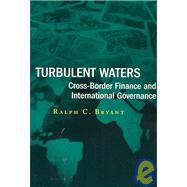
Note: Supplemental materials are not guaranteed with Rental or Used book purchases.
Purchase Benefits
Looking to rent a book? Rent Turbulent Waters Cross-Border Finance and International Governance [ISBN: 9780815700715] for the semester, quarter, and short term or search our site for other textbooks by Bryant, Ralph C.. Renting a textbook can save you up to 90% from the cost of buying.
| Foreword | xiii | ||||
| Acknowledgments | xv | ||||
| 1 Introduction: Financial Turbulence and Financial Governance | 1 | (20) | |||
|
3 | (1) | |||
|
4 | (2) | |||
|
6 | (3) | |||
|
9 | (2) | |||
|
11 | (1) | |||
|
12 | (3) | |||
|
15 | (1) | |||
|
16 | (5) | |||
| 2 Saving, Investment, and Financial Activity in a Single Closed Economy | 21 | (40) | |||
|
21 | (2) | |||
|
23 | (2) | |||
|
25 | (11) | |||
|
36 | (7) | |||
|
43 | (1) | |||
|
44 | (3) | |||
|
47 | (14) | |||
| 3 Collective Governance for Financial Activity | 61 | (36) | |||
|
61 | (2) | |||
|
63 | (3) | |||
|
66 | (1) | |||
|
67 | (2) | |||
|
69 | (4) | |||
|
73 | (1) | |||
|
74 | (4) | |||
|
78 | (2) | |||
|
80 | (13) | |||
|
93 | (4) | |||
| 4 Political Economy in a Multination, Intermediate World | 97 | (35) | |||
|
98 | (1) | |||
|
99 | (7) | |||
|
106 | (4) | |||
|
110 | (3) | |||
|
113 | (6) | |||
|
119 | (5) | |||
|
124 | (4) | |||
|
128 | (2) | |||
|
130 | (2) | |||
| 5 The Progressive Internationalization of Finance | 132 | (22) | |||
|
132 | (2) | |||
|
134 | (1) | |||
|
135 | (10) | |||
|
145 | (6) | |||
|
151 | (3) | |||
| 6 Analytical Issues in Cross-Border Finance: An Introduction | 154 | (49) | |||
|
154 | (5) | |||
|
159 | (6) | |||
|
165 | (7) | |||
|
172 | (31) | |||
| 7 International Collective Governance | 203 | (41) | |||
|
206 | (2) | |||
|
208 | (14) | |||
|
222 | (14) | |||
|
236 | (2) | |||
|
238 | (6) | |||
| 8 International Financial Architecture | 244 | (37) | |||
|
246 | (2) | |||
|
248 | (3) | |||
|
251 | (5) | |||
|
256 | (3) | |||
|
259 | (4) | |||
|
263 | (5) | |||
|
268 | (13) | |||
| 9 Priorities for Architectural Reform: Supranational Surveillance and IMF Lending | 281 | (22) | |||
|
285 | (10) | |||
|
295 | (8) | |||
| 10 Priorities for Architectural Reform: Prudential Financial Oversight, Crisis Management, and the Mandate for the IMF | 303 | (40) | |||
|
303 | (14) | |||
|
317 | (12) | |||
|
329 | (1) | |||
|
330 | (10) | |||
|
340 | (3) | |||
| 11 Single-Nation and Systemic Guidelines for Cross-Border Finance | 343 | (37) | |||
|
344 | (23) | |||
|
367 | (13) | |||
| 12 A Perspective on Financial Activity and Financial Turbulence | 380 | (10) | |||
|
380 | (1) | |||
|
381 | (1) | |||
|
382 | (1) | |||
|
383 | (1) | |||
|
384 | (1) | |||
|
385 | (1) | |||
|
386 | (4) | |||
| 13 The Evolution of International Financial Governance | 390 | (29) | |||
|
391 | (3) | |||
|
394 | (4) | |||
|
398 | (5) | |||
|
403 | (7) | |||
|
410 | (3) | |||
|
413 | (6) | |||
| Appendix: The IMF and Other International Financial Institutions | 419 | (42) | |||
|
420 | (5) | |||
|
425 | (15) | |||
|
440 | (4) | |||
|
444 | (8) | |||
|
452 | (1) | |||
|
453 | (2) | |||
|
455 | (3) | |||
|
458 | (3) | |||
| References | 461 | (20) | |||
| Index | 481 |
The New copy of this book will include any supplemental materials advertised. Please check the title of the book to determine if it should include any access cards, study guides, lab manuals, CDs, etc.
The Used, Rental and eBook copies of this book are not guaranteed to include any supplemental materials. Typically, only the book itself is included. This is true even if the title states it includes any access cards, study guides, lab manuals, CDs, etc.